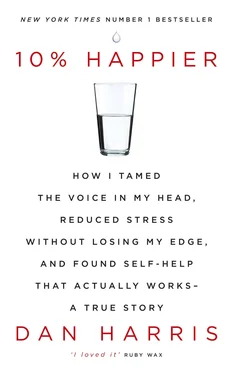It’s fascinating to engage with the people around whom I’d spun rather elaborate stories during the silence. Turns out, they’re totally normal. I have lunch with a handsome German woman, who admits that she called her kids a couple of times. Also at the table is a middle-aged technology executive, who says he came on a lark and largely enjoyed it.
A young Asian guy approaches me. He’s athletic and good-looking. In observing him over the past days, I had assumed he would be stern and serious. Turns out, he’s super friendly. He tells me he felt “privileged” to be near me during that metta session when I cried. This produces a starburst of conflicting emotions, including gratitude and embarrassment. I mumble something and extricate myself.
The teachers warned us that the real world would seem clangorous and jangly after ten days of silence, but as I pull away from Spirit Rock in a cab, I turn on my BlackBerry and devour my email with curiosity more than dread. I visit my sister-in-law and enjoy being climbed on by her two young children. On the plane, I binge on TV shows on my iPhone. The habits of a lifetime reassert themselves with astonishing speed. It may have been one of—if not the —most meaningful experiences of my life, but I was nonetheless ready for it to end.
I knew my television career had undergone a radical shift when I found myself reading the following line off the teleprompter: “Now to the story of Irwin the paralyzed kangaroo . . .” Cut to a live shot of a woman holding a handicapped marsupial dressed up in a shirt, tie, and vest. At which point I blurted out, with forced jollity, “I like Irwin’s new suit! He’s looking dashing!” I was smiling on-screen, but inside, my ego was hissing, You are a dope.
I was in the midst of an object lesson in the Buddhist concept of “suffering,” which in this case could be roughly translated into “Be careful what you wish for.”
On a Friday afternoon, shortly after I’d come back from the retreat, a particularly chipper David Westin strolled into my office, stuck out his hand, and offered me the job as weekend co-anchor of Good Morning America .
I was elated and relieved, light-headed with glee. It was as if I had totally forgotten all of Joseph’s dharma talks about the impossibility of lasting satisfaction. I felt as if months of worrying about my place in the news division and my future in the industry could finally cease. All of my problems were solved. Deliverance!
What came next was a series of developments that could have been authored by the Buddha himself. Two days after Westin strode into my office and confidently extended the offer, I was at home when I saw the following headline on the New York Times website: “Chief of ABC News Is Resigning.”
When I got back into work the next morning, it was quickly made clear to me by various senior executives that Westin would be staying on as president for many more months, and that the offer still stood. That meant it was time to negotiate my new contract, which produced a fresh whole set of challenges. Talks quickly got bogged down over a variety of minor issues. Both sides dug in their heels. There came a moment where the entire thing appeared to be in jeopardy.
After several weeks of stasis, in an attempt to break the impasse, the executive producer of GMA , Jim Murphy, called me in for a meeting. Murphy (everyone called him by his last name) had been EP for several years, during which time I had grown quite fond of him. He was a tall, nattily dressed guy with slicked-back, salt-and-pepper hair, a soul patch, and a taste for cigarettes, booze, and sardonic humor.
As I sat across from him in his corner office, which had a panoramic view of Lincoln Center, I was prepared for Murphy to try to convince me that I should drop my various demands. I expected him to make the case that these issues were really not as important as I was making them out to be. Instead, he chose a more aggressive tack.
“Can I tell you something as a friend?” he asked. “Because I know,” he said in his winning entre nous way, “that you, unlike other people around here, won’t get overly sensitive about it.”
“Sure,” I said, shifting in my chair, trying to affect nonchalance.
“You’re never going to be the anchor of a major weekday newscast,” he said with a casual certainty that made my stomach drop. “You don’t have the looks,” he went on, “and your voice is too grating.”
He had me in a funny spot. Having coolly promised him that I could take whatever he had to say without getting too sensitive, I couldn’t very well lash out as he killed my dreams. So I pretended not to be poleaxed as we wrapped up the meeting and I limped out of his office.
While my communication with my bosses was, to say the least, unsatisfying, I did meanwhile have a sudden epiphany about how to talk about meditation without looking like a freak.
My disappearing on retreat for ten days with no email or phone contact naturally provoked a lot of questions, which outed me as a meditator, and forced me to discuss my new practice with a much wider group.
At first, these conversations didn’t go so well. At my family’s annual summer pool party, just weeks after my time with Goldstein in California, my father pointedly told me a story about some people he knew who had discovered meditation and subsequently become “like, totally ineffective.” Later, he warily asked me, “So, are you a Buddhist now?” To which I muttered some sort of flustered nonanswer.
Among my broader group of friends and coworkers, the retreat spurred queries as skeptical as my father’s. “You did what on your summer vacation?” they’d ask. The subtext always seemed to be “So you’ve pretty much joined a cult, haven’t you?” I could tell that people were thinking what I certainly would have been thinking if I were in their shoes: that I had become one of those people, the formerly normal guy who arrives at middle age and adopts some sort of strange spirituality.
Whenever I was asked about meditation, I would either clam up and get a sheepish look on my face, the way dogs in Manhattan do when they’re going to the bathroom on the street, or I would launch into an off-putting, overly emphatic lecture about the benefits of mindfulness, how it was actually a superpower, how it really wasn’t as weird as everyone thought, and didn’t involve “clearing the mind,” and so on. I could see the tinge of mild terror in my listener’s eyes—the cornered interlocutor politely but frantically looking for any means of egress.
There were a few things I was attempting, with varying degrees of ham-handedness, to achieve in these interchanges. Mostly I was trying to defend my reputation, to make sure people didn’t think I was a loon. But there was something else. The more I meditated, the more I looked around and appreciated that we all have monkey minds—that everyone has their own Weirs and Muirs they’re competing against, their own manufactured balding crises (and, of course, the kinds of more serious collisions with impermanence from which I had mercifully been spared thus far). Especially after my powerful experiences on retreat, I felt compelled to share what I had learned. I just couldn’t figure out how to do this effectively. At one point, during a work meeting, for example, I mentioned to Barbara Walters that I was considering writing a book on mindfulness. She smiled and replied, “Don’t quit your day job.”
After several weeks of this, I had a fateful conversation with my friend Kris, a senior producer at GMA . She’d been a mentor of mine since my earliest days at ABC. We had a no-holds-barred relationship, which usually consisted of her making fun of me for some on- or off-air foible. One day, we were chatting at the GMA rim when the subject of my recent “vacation” came up. She shot me a funny look and said, “What’s with you and the whole meditation thing?”
Читать дальше












